This post is written as part of the #MulaiDariLemari campaign from Tukar Baju
As you know, I am an advocate for slow fashion. On this blog and social media, I often share tips on how to support slow fashion, how to thrift more effectively, how to love your clothes more, my decluttering experience and several slow fashion brands. However, it has been an awfully long time since I last shared some local ethical fashion brands here on the blog, so I thought today I’d create a master guide of all the brands that I’ve known thus far.
Before we go on, I believe it’s important to set a definition for what constitutes as “ethical” here. These brands take environmental and social impact into consideration, especially with the manufacturing process, which means their products are made of eco-friendly materials and their workers are paid fair wages—often they, too, strive to preserve local culture. Without further ado, here are some Indonesian slow fashion brands you can support.
Apparel
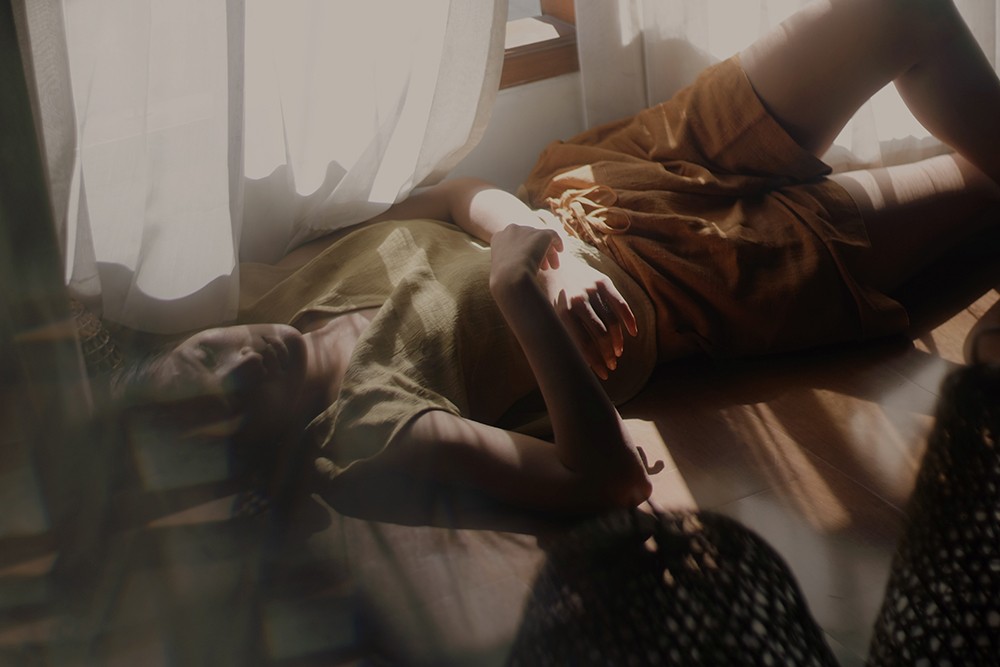 |
Photo by Jalin |
Let’s start with the basic apparels, shall we? These are brands that usually offer minimalistic styles and colours in their products. Ethnologi, Jalin, Kana and Imaji Studio have quite similar vibes, with the pretty baggy-silhouetted, naturally-dyed items they provide. Their products tend to have subtle patterns—such as tie-dye or shibori—if there are any.
Kana, in particular, brings the traditional batik technique to the modern world, by using entirely new patterns and minimalism. Stain offers a more vibrant selection of products, with incredible colour-blocking and bold lines as the go-to motif. Then there is Liberty Society who provides eco-friendly t-shirts, dresses, jumpers and more while supporting refugee women in Indonesia. Last but not least, we have Goenali, whose products are made out of upcycled materials.
Ethnologi || Goenali || Imaji Studio || Jalin || Kana || Liberty Society || Stain
 |
Photo by Sejauh Mata Memandang |
Then there are a couple of brands that carry batik very well. First, we have Pithecanthropus, who showcases some of the best traditional batik patterns with amazingly modern silhouette, giving the motif a fresh, new look. With a wide range of collections—from shirt and dress, to pants and jumpsuits—they have something for everyone.
Sejauh Mata Memandang, on the other hand, uses the batik technique to create entirely modern patterns, yet still manages to give it batik’s signature characteristics. They also often hold exhibitions on the release of their newest collections, as well as raise awareness on our rising waste issue.
Pithecanthropus || Sejauh Mata Memandang
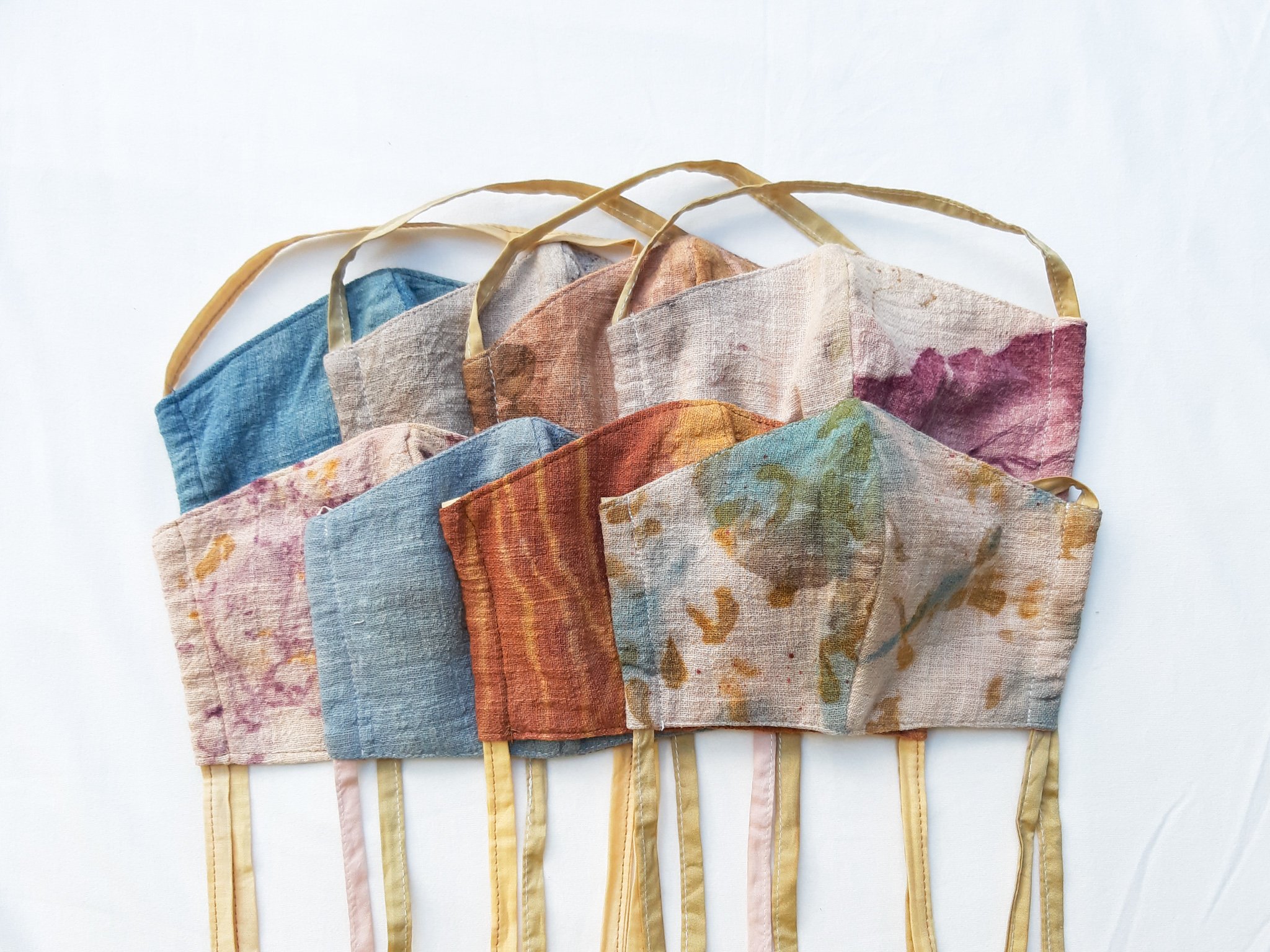 |
Photo by Cinta Bumi Artisans |
Next we have a couple brands that use the technique of ecoprinting for their products. If you don’t know, ecoprinting is a dyeing technique that uses leaves and flowers as a dyeing agent, by pressing them into the fabric, submerging not only their colours but also form. It is possibly the most natural dyeing method and materials that you can use for a garment.
Cinta Bumi Artisans supplies all sorts of products, including t-shirt, scarves and bags. They also use barkcloth for their fabric, which is incredibly unique and innovative. Petals et Bloom actually sells strictly accessories only, including scarves, ribbons and tote bags. They have a pretty clean silhouette, with leaves on white fabric for almost all their products, which has become a sort of signature for them.
Semilir, meanwhile, offers a diverse selection of items, including dresses, outwear, masks and wallets. They also use all kinds of fabrics, ranging from cotton, vegan leather, tree bark, to jute—which creates a variety of textures.
Cinta Bumi Artisans || Petals et Bloom || Semilir
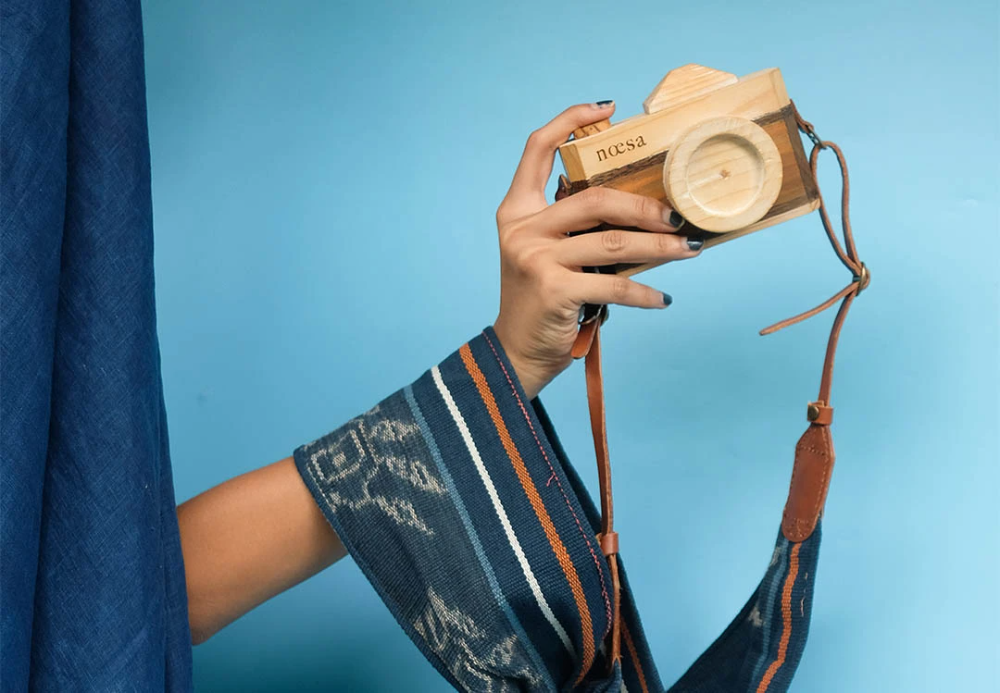 |
Photo by Noesa |
Last but not least—from this category, there are the brands who use the tenun/weaving methods for their products. Most of them use the tenun ikat method of traditional east Indonesian culture.
You might recognise the name IKAT by Didiet Maulana, as it is the most prestigious out of the lot. They have the most elegant selection of items, including new-normal kits and prayer mats. Angin Timur and Copa de Flores both offer a more casual look for the masses, with beautiful silhouettes of clothing with tenun accents on them. Noesa supplies a number of unique accessories in high quality, including camera straps, bandana, masks and wallets—personally, I am obsessed!
Then there’s Petanghari, the only one of the lot that isn’t tenun ikat, but actually handwoven by the artisan at home. They offer a selection of shirts, scarves, bags and hats. Each weave is unique and puts great colour-blocking to use.
Angin Timur || Copa de Flores || IKAT by Didiet Maulana || Noesa || Petanghari
Accessories
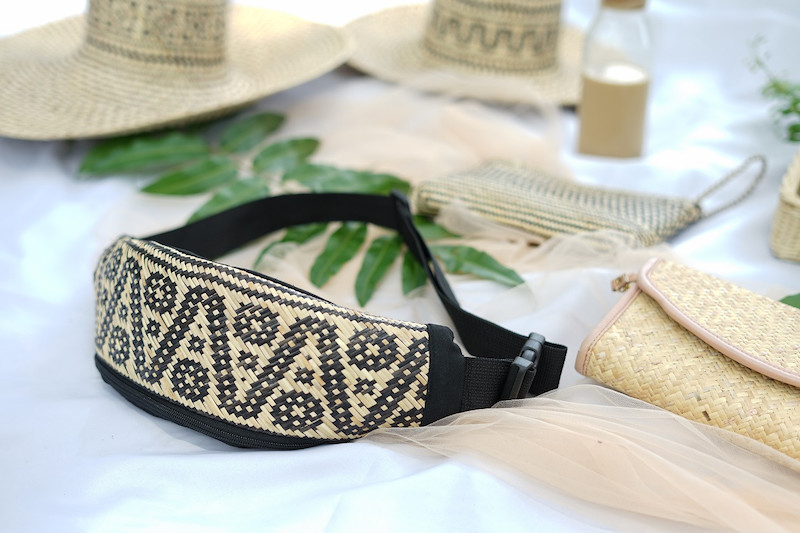 |
Photo by Handepharuei |
Starting from bags, jewelry, hats and scarves, these brands have got them all. Let’s start with Handepharuei, which is a bag brand based in Palangkaraya at the heart of Borneo. They offer a selection of handwoven rattan bags, usually combined with leather—or cotton for the vegan option. Me Sayang is also a handwoven-bag brand, but based in Bali and using ata grass—which got quite the hype around 2-3 years ago. There are a lot of knock-offs for this kind of bags, but it’s actually traditionally Balinese—bet you didn’t know that.
Our next brand, Sadhu, also makes such ata bags along with a wide range of jewelry, especially earrings, out of the same material. They combine handwoven items with mother-of-pearl accents really well—who knew they’d make a nice pair?
The last two are quite unique in comparison. Topiku creates products that are made out of recycled and upcycled materials, including plastic HDPE, cotton offcuts and metal scraps, meanwhile Threadapeutic collaborates with other brands—not only clothing—to upcycle their scrap materials and blend them together to create bags, masks and tapestries.
Handepharuei || Me Sayang || Sadhu || Topiku || Threadapeutic
Footwear
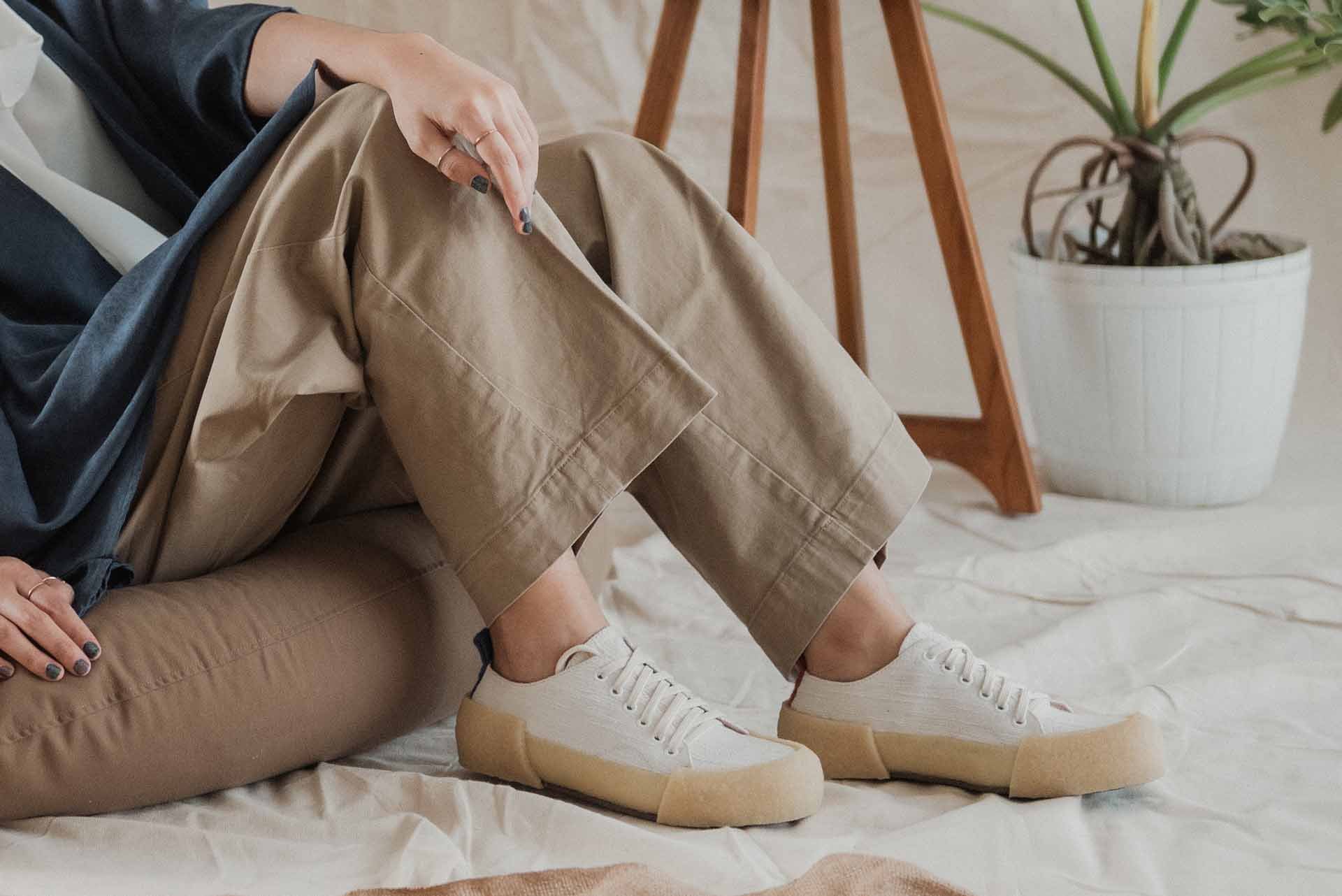 |
Photo by Pijak Bumi |
While Indonesia has a few ethical footwear brands, unfortunately, they all cater to a more masculine target market. They mostly consist of sneakers and/or slip-ons. First of all, we’ve got NARAY who provides shoes with traditional handwoven stagen for their upper shoe. Unfortunately, I have no information regarding their out sole and the kind of dye that they use, but they swear by their commitment for the environment.
Next, we have Pijak Bumi, a footwear brand that uses veggie-tanned leather, handwoven fabric and crepe sole for their shoes. They tend to be more minimalistic in their patterns and colours, while also providing numerous styles of footwear, including sandals and ballerina flats.
Lastly, there’s Raftheoo, a naturally-dyed footwear brand with a unique sole design. They use mostly canvas material and rubber for the soles—and everything is handwoven—although they still like to experiment with fabric to innovate for future products.
NARAY || Pijak Bumi || Raftheoo
Swimwear & Loungewear
 |
Photo by Eau |
Truth be told, I didn’t expect there to be a lot of ethical swimwear brands to choose from. Mind you, they might not be 100% ethical, but the sentiment is there and it’s still an option for you. First of all, there’s Eau, a swimwear brand, founded in 2018, that created a whole sustainable collection out of regenerated nylon fibres out of fishing nets and recycled polyamide. Their products are more luxurious and minimalistic in its limited use of colours—but with really unique silhouette.
Then there’s Olenka, a resort- and swimwear based in Bali, who makes their products locally. Their resortwear are mostly made out of 100% rayon and natural tamarillo prints, while their swimsuits are made out of nylone and polyamide—I’m not sure how sustainable these are, to be honest, but they’re all locally made, at least.
Last but not least, we’ve got This Is Kaftan who offers a selection of resortwear made entirely of TENCEL. Also based in Bali, this brand provides a number of kimonos, rompers and—well, obviously—kaftans in beautiful floral patterns.
Eau || Olenka || This Is Kaftan
Children’s
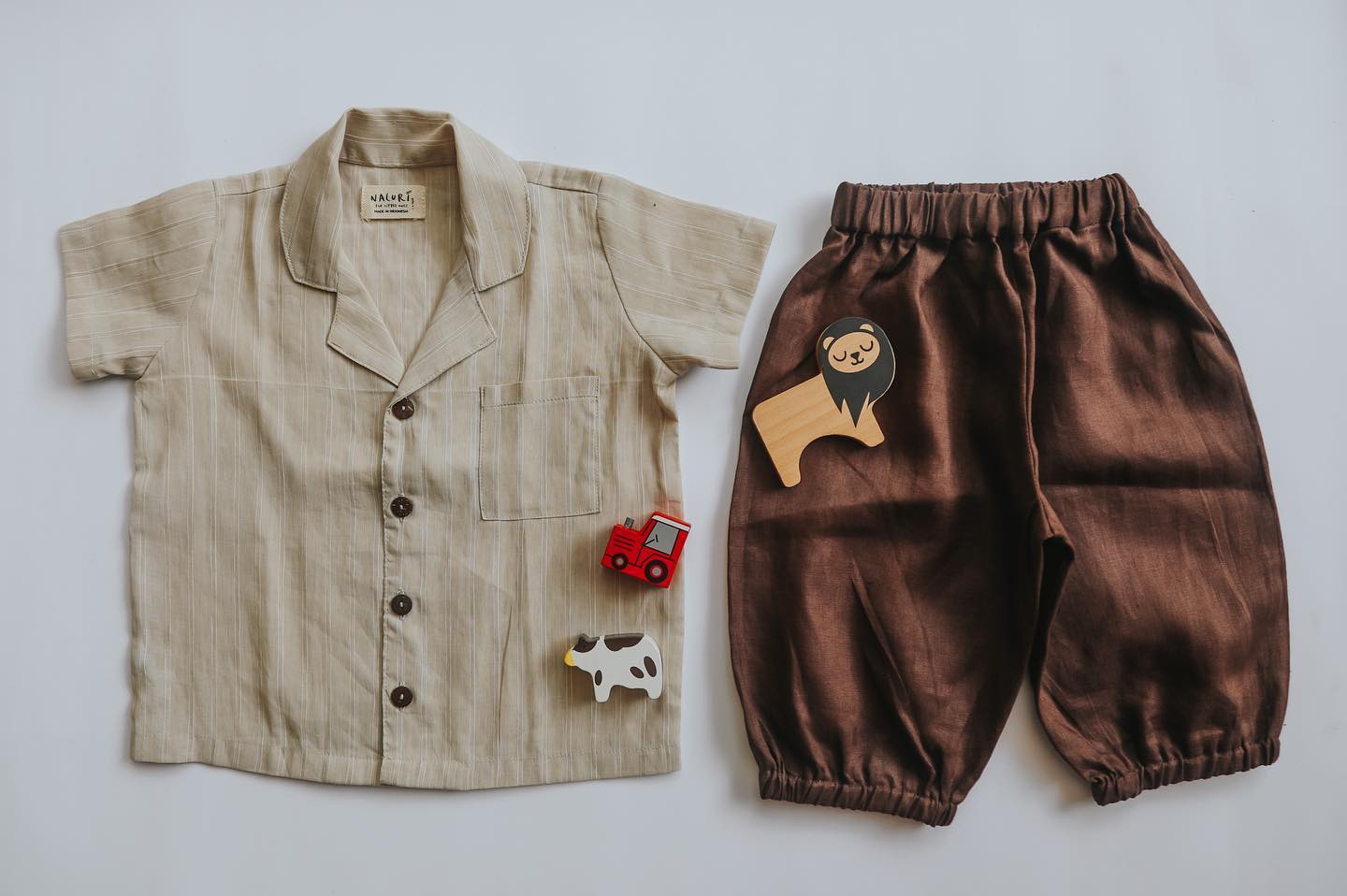 |
Photo by Naluri |
This section is probably what I love most about the ethical fashion industry in Indonesia. I love that we think about children, even as we move towards more sustainable fashion—we almost never hear about the children when it comes to fashion! These two are what I found completely by chance—although I am not with child just yet.
Firstly, there’s Meadow, which is a minimalistic take of children’s clothing with their earth-tone colours and limited patterns. They mostly use 100% linen for their products, with some cotton silks here and there.
Secondly, we have Naluri, which is a daintier take on children’s clothing, with frills, floral patterns and gingham in their collections. They have a whole collection made out of TENCEL, while also re-purposing scrap materials for smaller products and recycled materials for their packaging.
Meadow || Naluri
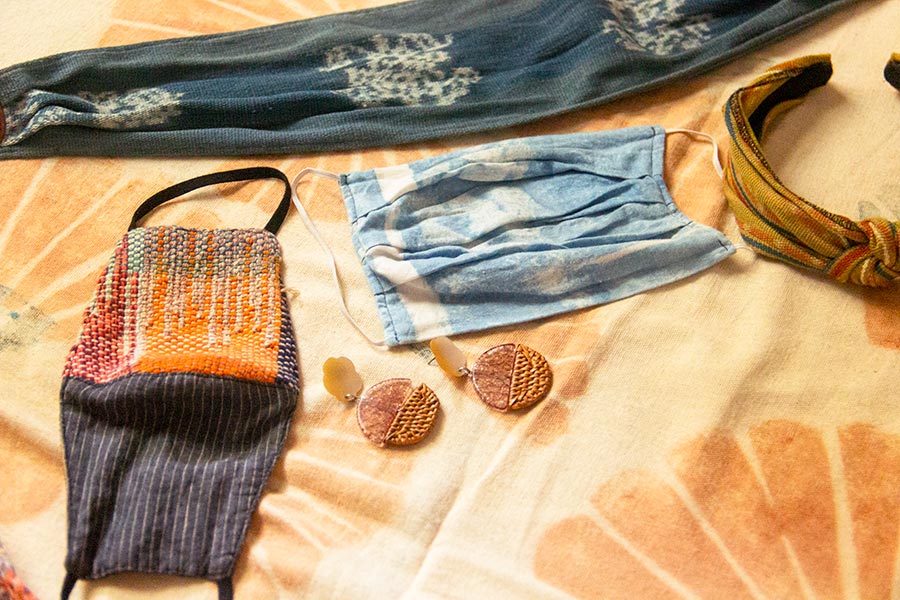 Do you know any other local ethical brands? Please recommend them in the comments!
Do you know any other local ethical brands? Please recommend them in the comments!
This post is written as part of the #MulaiDariLemari campaign from Tukar Baju
As you know, I am an advocate for slow fashion. On this blog and social media, I often share tips on how to support slow fashion, how to thrift more effectively, how to love your clothes more, my decluttering experience and several slow fashion brands. However, it has been an awfully long time since I last shared some local ethical fashion brands here on the blog, so I thought today I’d create a master guide of all the brands that I’ve known thus far.
Before we go on, I believe it’s important to set a definition for what constitutes as “ethical” here. These brands take environmental and social impact into consideration, especially with the manufacturing process, which means their products are made of eco-friendly materials and their workers are paid fair wages—often they, too, strive to preserve local culture. Without further ado, here are some Indonesian slow fashion brands you can support.
Apparel
 |
Photo by Jalin |
Let’s start with the basic apparels, shall we? These are brands that usually offer minimalistic styles and colours in their products. Ethnologi, Jalin, Kana and Imaji Studio have quite similar vibes, with the pretty baggy-silhouetted, naturally-dyed items they provide. Their products tend to have subtle patterns—such as tie-dye or shibori—if there are any.
Kana, in particular, brings the traditional batik technique to the modern world, by using entirely new patterns and minimalism. Stain offers a more vibrant selection of products, with incredible colour-blocking and bold lines as the go-to motif. Then there is Liberty Society who provides eco-friendly t-shirts, dresses, jumpers and more while supporting refugee women in Indonesia. Last but not least, we have Goenali, whose products are made out of upcycled materials.
Ethnologi || Goenali || Imaji Studio || Jalin || Kana || Liberty Society || Stain
 |
Photo by Sejauh Mata Memandang |
Then there are a couple of brands that carry batik very well. First, we have Pithecanthropus, who showcases some of the best traditional batik patterns with amazingly modern silhouette, giving the motif a fresh, new look. With a wide range of collections—from shirt and dress, to pants and jumpsuits—they have something for everyone.
Sejauh Mata Memandang, on the other hand, uses the batik technique to create entirely modern patterns, yet still manages to give it batik’s signature characteristics. They also often hold exhibitions on the release of their newest collections, as well as raise awareness on our rising waste issue.
Pithecanthropus || Sejauh Mata Memandang
 |
Photo by Cinta Bumi Artisans |
Next we have a couple brands that use the technique of ecoprinting for their products. If you don’t know, ecoprinting is a dyeing technique that uses leaves and flowers as a dyeing agent, by pressing them into the fabric, submerging not only their colours but also form. It is possibly the most natural dyeing method and materials that you can use for a garment.
Cinta Bumi Artisans supplies all sorts of products, including t-shirt, scarves and bags. They also use barkcloth for their fabric, which is incredibly unique and innovative. Petals et Bloom actually sells strictly accessories only, including scarves, ribbons and tote bags. They have a pretty clean silhouette, with leaves on white fabric for almost all their products, which has become a sort of signature for them.
Semilir, meanwhile, offers a diverse selection of items, including dresses, outwear, masks and wallets. They also use all kinds of fabrics, ranging from cotton, vegan leather, tree bark, to jute—which creates a variety of textures.
Cinta Bumi Artisans || Petals et Bloom || Semilir
 |
Photo by Noesa |
Last but not least—from this category, there are the brands who use the tenun/weaving methods for their products. Most of them use the tenun ikat method of traditional east Indonesian culture.
You might recognise the name IKAT by Didiet Maulana, as it is the most prestigious out of the lot. They have the most elegant selection of items, including new-normal kits and prayer mats. Angin Timur and Copa de Flores both offer a more casual look for the masses, with beautiful silhouettes of clothing with tenun accents on them. Noesa supplies a number of unique accessories in high quality, including camera straps, bandana, masks and wallets—personally, I am obsessed!
Then there’s Petanghari, the only one of the lot that isn’t tenun ikat, but actually handwoven by the artisan at home. They offer a selection of shirts, scarves, bags and hats. Each weave is unique and puts great colour-blocking to use.
Angin Timur || Copa de Flores || IKAT by Didiet Maulana || Noesa || Petanghari
Accessories
 |
Photo by Handepharuei |
Starting from bags, jewelry, hats and scarves, these brands have got them all. Let’s start with Handepharuei, which is a bag brand based in Palangkaraya at the heart of Borneo. They offer a selection of handwoven rattan bags, usually combined with leather—or cotton for the vegan option. Me Sayang is also a handwoven-bag brand, but based in Bali and using ata grass—which got quite the hype around 2-3 years ago. There are a lot of knock-offs for this kind of bags, but it’s actually traditionally Balinese—bet you didn’t know that.
Our next brand, Sadhu, also makes such ata bags along with a wide range of jewelry, especially earrings, out of the same material. They combine handwoven items with mother-of-pearl accents really well—who knew they’d make a nice pair?
The last two are quite unique in comparison. Topiku creates products that are made out of recycled and upcycled materials, including plastic HDPE, cotton offcuts and metal scraps, meanwhile Threadapeutic collaborates with other brands—not only clothing—to upcycle their scrap materials and blend them together to create bags, masks and tapestries.
Handepharuei || Me Sayang || Sadhu || Topiku || Threadapeutic
Footwear
 |
Photo by Pijak Bumi |
While Indonesia has a few ethical footwear brands, unfortunately, they all cater to a more masculine target market. They mostly consist of sneakers and/or slip-ons. First of all, we’ve got NARAY who provides shoes with traditional handwoven stagen for their upper shoe. Unfortunately, I have no information regarding their out sole and the kind of dye that they use, but they swear by their commitment for the environment.
Next, we have Pijak Bumi, a footwear brand that uses veggie-tanned leather, handwoven fabric and crepe sole for their shoes. They tend to be more minimalistic in their patterns and colours, while also providing numerous styles of footwear, including sandals and ballerina flats.
Lastly, there’s Raftheoo, a naturally-dyed footwear brand with a unique sole design. They use mostly canvas material and rubber for the soles—and everything is handwoven—although they still like to experiment with fabric to innovate for future products.
NARAY || Pijak Bumi || Raftheoo
Swimwear & Loungewear
 |
Photo by Eau |
Truth be told, I didn’t expect there to be a lot of ethical swimwear brands to choose from. Mind you, they might not be 100% ethical, but the sentiment is there and it’s still an option for you. First of all, there’s Eau, a swimwear brand, founded in 2018, that created a whole sustainable collection out of regenerated nylon fibres out of fishing nets and recycled polyamide. Their products are more luxurious and minimalistic in its limited use of colours—but with really unique silhouette.
Then there’s Olenka, a resort- and swimwear based in Bali, who makes their products locally. Their resortwear are mostly made out of 100% rayon and natural tamarillo prints, while their swimsuits are made out of nylone and polyamide—I’m not sure how sustainable these are, to be honest, but they’re all locally made, at least.
Last but not least, we’ve got This Is Kaftan who offers a selection of resortwear made entirely of TENCEL. Also based in Bali, this brand provides a number of kimonos, rompers and—well, obviously—kaftans in beautiful floral patterns.
Eau || Olenka || This Is Kaftan
Children’s
 |
Photo by Naluri |
This section is probably what I love most about the ethical fashion industry in Indonesia. I love that we think about children, even as we move towards more sustainable fashion—we almost never hear about the children when it comes to fashion! These two are what I found completely by chance—although I am not with child just yet.
Firstly, there’s Meadow, which is a minimalistic take of children’s clothing with their earth-tone colours and limited patterns. They mostly use 100% linen for their products, with some cotton silks here and there.
Secondly, we have Naluri, which is a daintier take on children’s clothing, with frills, floral patterns and gingham in their collections. They have a whole collection made out of TENCEL, while also re-purposing scrap materials for smaller products and recycled materials for their packaging.

